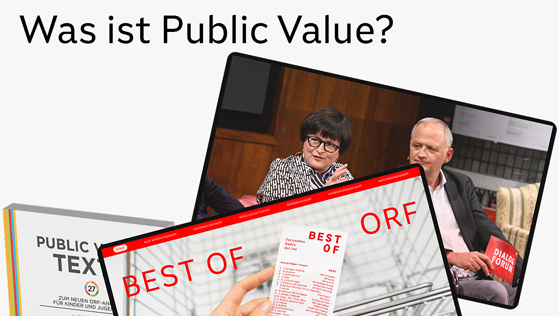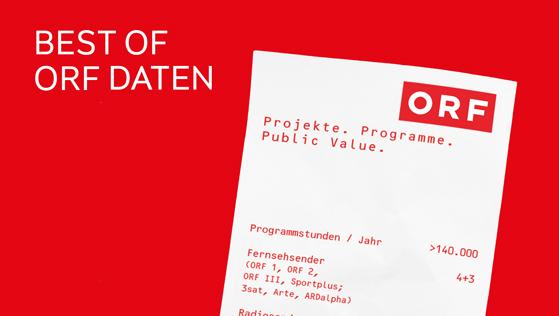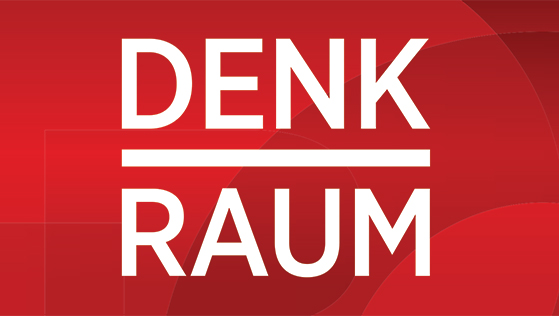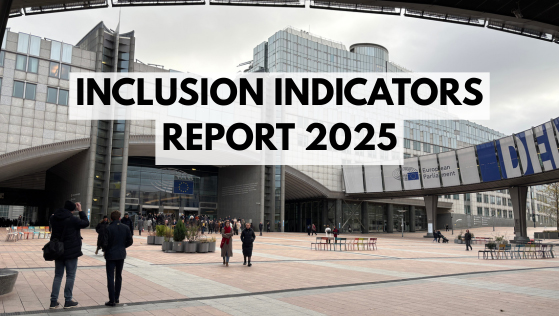 In Europa fehlt es an Daten zu Menschen mit intellektuellen Behinderungen. Die Non-Profit Organisation Inclusion Europe erhob deshalb eigene Daten und veröffentlichte zum dritten Mal den „Inclusion Indicators Report“. Dieser zeigt, dass es noch viel zu tun gibt, um die Inklusion in Europa zu verbessern.
In Europa fehlt es an Daten zu Menschen mit intellektuellen Behinderungen. Die Non-Profit Organisation Inclusion Europe erhob deshalb eigene Daten und veröffentlichte zum dritten Mal den „Inclusion Indicators Report“. Dieser zeigt, dass es noch viel zu tun gibt, um die Inklusion in Europa zu verbessern.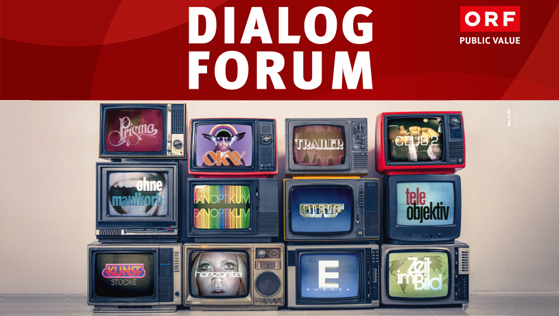 Was der ORF aus seiner Vergangenheit lernen kann
Was der ORF aus seiner Vergangenheit lernen kann Qualitätsjournalismus ist durch massive Sparmaßnahmen akut bedroht. Weltweit agierende Konzerne gefährden sowohl die digitale Souveränität Europas als auch die Relevanz und Existenz der traditionellen Medien. Autokratische Regierungen attackieren die Unabhängigkeit öffentlich-rechtlicher Medien. Das ist der Befund des Jahres 2025 über die Lage des Journalismus.
Qualitätsjournalismus ist durch massive Sparmaßnahmen akut bedroht. Weltweit agierende Konzerne gefährden sowohl die digitale Souveränität Europas als auch die Relevanz und Existenz der traditionellen Medien. Autokratische Regierungen attackieren die Unabhängigkeit öffentlich-rechtlicher Medien. Das ist der Befund des Jahres 2025 über die Lage des Journalismus.Guido Baumhauer, Deutsche Welle
Judith Elhenicky, Sachbearbeiterin
Felix Hlatky, Mastodon
Michal Hvorecky, slowakischer Autor und Journalist
Konrad Paul Liessmann, Philosoph
Philipp Maschl, ORF „ZIB Magazin Media“
David Steffens, Lie Detectors
Moderation: Klaus Unterberger, ORF Public Value
Die TV-Aufzeichnung für ORF III wird live auf zukunft.ORF.at gestreamt.
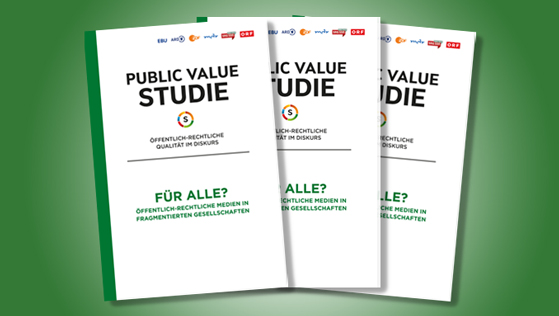 Gemeinsam mit Fachleuten aus dem Medien-Bereich wird das ORF-Programm regelmäßig untersucht.
Gemeinsam mit Fachleuten aus dem Medien-Bereich wird das ORF-Programm regelmäßig untersucht.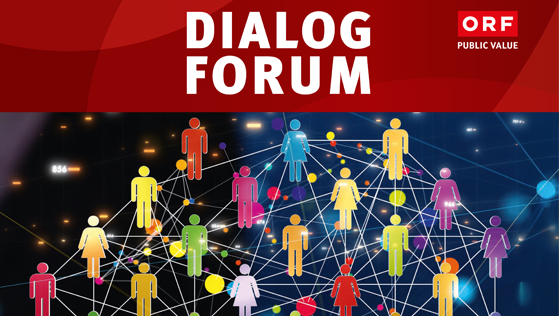 Der öffentlich-rechtliche Auftrag ist klar und deutlich: Der ORF soll in seiner Medienproduktion die gesamte Bevölkerung berücksichtigen. Doch was bedeutet das in Zeiten zunehmender Segmentierung und Polarisierung der Gesellschaft? Wie können tatsächlich alle gesellschaftlichen Gruppen, egal ob arm oder reich, Stadt oder Land, jung oder alt, Mehrheit oder Minderheit entsprechend zu Wort kommen? Diese Fragen stehen im Mittelpunkt der aktuellen PUBLIC VALUE STUDIE „Für Alle?“, an der sich auch ARD, ZDF, SRG, MDR und der Europäische Dachverband der öffentlich-rechtlichen Medien, EBU, beteiligt haben.
Der öffentlich-rechtliche Auftrag ist klar und deutlich: Der ORF soll in seiner Medienproduktion die gesamte Bevölkerung berücksichtigen. Doch was bedeutet das in Zeiten zunehmender Segmentierung und Polarisierung der Gesellschaft? Wie können tatsächlich alle gesellschaftlichen Gruppen, egal ob arm oder reich, Stadt oder Land, jung oder alt, Mehrheit oder Minderheit entsprechend zu Wort kommen? Diese Fragen stehen im Mittelpunkt der aktuellen PUBLIC VALUE STUDIE „Für Alle?“, an der sich auch ARD, ZDF, SRG, MDR und der Europäische Dachverband der öffentlich-rechtlichen Medien, EBU, beteiligt haben.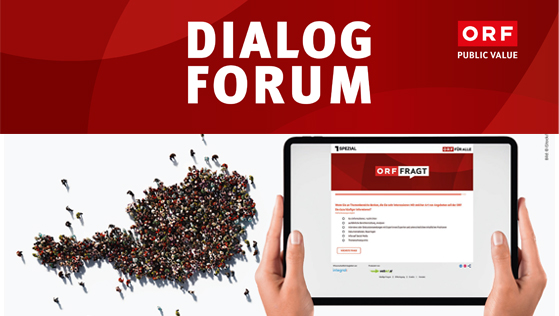 Anlässlich der österreichweiten Online-Umfrage "ORF fragt" unternimmt das DialogForum einen Reality-Check: Wie denken die Menschen in Österreich wirklich? Was macht ihnen Sorgen? Verbinden sie mit ihrer Zukunft persönliche Hoffnungen oder doch Ängste? Vertrauen sie den Medien, der Politik und der Demokratie?
Anlässlich der österreichweiten Online-Umfrage "ORF fragt" unternimmt das DialogForum einen Reality-Check: Wie denken die Menschen in Österreich wirklich? Was macht ihnen Sorgen? Verbinden sie mit ihrer Zukunft persönliche Hoffnungen oder doch Ängste? Vertrauen sie den Medien, der Politik und der Demokratie?Mehr Information:
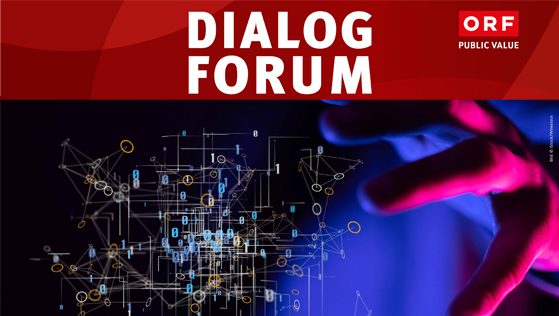 Missbrauch der persönlichen Daten, Überwachung, Manipulation von Wahlen, Fake News und eine unkontrollierbare künstliche Intelligenz: Längst sind die dunklen Schatten des Internets bekannt und gefürchtet. Wie können sich Mediennutzer:innen davor schützen? Wie kann sich Europa angesichts der weltweit dominierenden Macht der digitalen Giganten aus den USA und China zur Wehr setzen? Vor allem aber: Wie kann es gelingen, dass Onlinekommunikation wieder der Demokratie nützt und nicht fremden, intransparenten Interessen?
Missbrauch der persönlichen Daten, Überwachung, Manipulation von Wahlen, Fake News und eine unkontrollierbare künstliche Intelligenz: Längst sind die dunklen Schatten des Internets bekannt und gefürchtet. Wie können sich Mediennutzer:innen davor schützen? Wie kann sich Europa angesichts der weltweit dominierenden Macht der digitalen Giganten aus den USA und China zur Wehr setzen? Vor allem aber: Wie kann es gelingen, dass Onlinekommunikation wieder der Demokratie nützt und nicht fremden, intransparenten Interessen?
Manuel „HonkHase“ Atug, Cyberexperte
Helmut Brandstätter, Sonderausschuss "European Democracy Shield" des Europaparlaments
Ingrid Brodnig, Publizistin
Christina Elmer, Technische Universität Dortmund
Katja Mayer, Zentrum für soziale Innovation
Sarah Spiekermann, Wirtschaftsuniversität Wien
Markus Spillmann, EMEK, Eidgenössische Medienkommission
Thomas Steinmaurer, Universität Salzburg
Billie Steirisch, Musikerin & Content Creatorin
Samantha Tady, Open Circle Lab
Moderation: Klaus Unterberger, ORF Public Value
Die TV-Aufzeichnung für ORF III wird live auf zukunft.ORF.at gestreamt.
Mehr Information:
https://european-alternatives.eu/de
https://opencirclelab.eu/
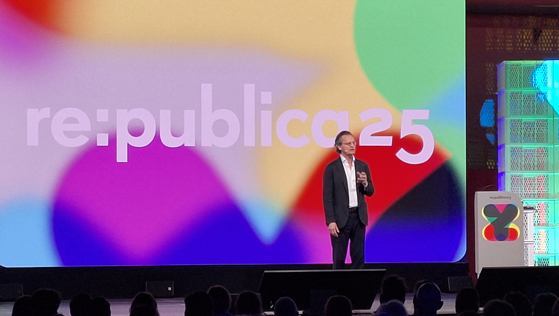 Auf der "Re:Publica", dem größten deutschen Digitalfestival fordern Fachleute stärkere Regulierung von Big Tech, mehr öffentlich-rechtliche Investitionen in europäische soziale Medien und den Aufbau einer europäischen Digital-Infrastruktur.
Auf der "Re:Publica", dem größten deutschen Digitalfestival fordern Fachleute stärkere Regulierung von Big Tech, mehr öffentlich-rechtliche Investitionen in europäische soziale Medien und den Aufbau einer europäischen Digital-Infrastruktur.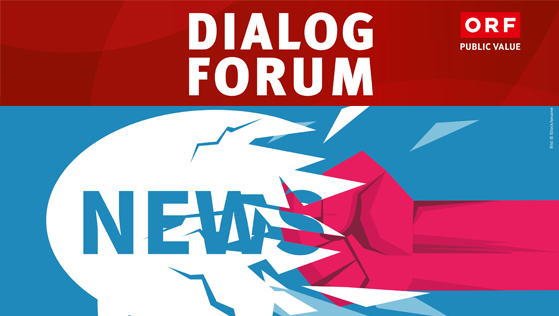 In den USA, aber auch in weiten Teilen Europas wenden sich Populistinnen und Populisten gegen Demokratie und Medien. Sie setzen falsche Informationen in die Welt, vereiteln Berichterstattung oder schüchtern Journalismus mit Klagen ein. Nicht zuletzt öffentlich-rechtliche Medien stehen im Mittelpunkt ihrer Aufmerksamkeit. Wie sollen Medien darauf reagieren? In der neuen Ausgabe von
In den USA, aber auch in weiten Teilen Europas wenden sich Populistinnen und Populisten gegen Demokratie und Medien. Sie setzen falsche Informationen in die Welt, vereiteln Berichterstattung oder schüchtern Journalismus mit Klagen ein. Nicht zuletzt öffentlich-rechtliche Medien stehen im Mittelpunkt ihrer Aufmerksamkeit. Wie sollen Medien darauf reagieren? In der neuen Ausgabe von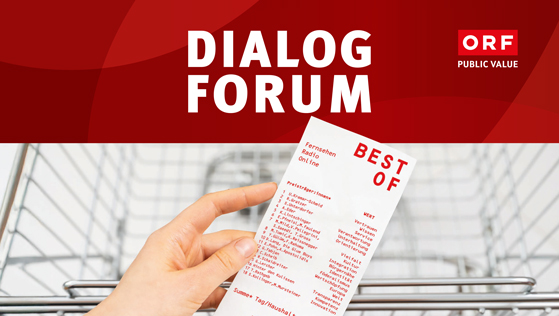 Qualität hat zuweilen auch einen Namen. Jedes Jahr werden rund 100 ORF-Mitarbeiter:innen bzw. -Produktionen für ihre journalistische und künstlerische Arbeit ausgezeichnet. Der aktuelle Public-Value-Bericht präsentiert eine Auswahl der Preisträger:innen und hat Wissenschafter:innen um einen Public-Value-Check gebeten. Woran lässt sich Medienqualität erkennen? Wie wird dadurch der öffentlich-rechtliche
Qualität hat zuweilen auch einen Namen. Jedes Jahr werden rund 100 ORF-Mitarbeiter:innen bzw. -Produktionen für ihre journalistische und künstlerische Arbeit ausgezeichnet. Der aktuelle Public-Value-Bericht präsentiert eine Auswahl der Preisträger:innen und hat Wissenschafter:innen um einen Public-Value-Check gebeten. Woran lässt sich Medienqualität erkennen? Wie wird dadurch der öffentlich-rechtliche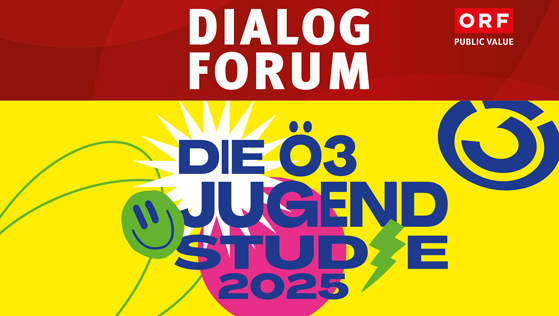 Das ist eine der Fragen der aktuellen Jugendstudie von Ö3. Dabei wurde in einen interaktiven Umfragetool ein Stimmungsbild der GenZ in Österreich erhoben. Es geht um Bildung, Arbeitswelt, Liebe, Sex, Familie, Freunde, Freizeit, Konsum, Mobilität, Geld, Umwelt, Gesundheit, Diversität, Politik, gesellschaftliche Beteiligung - und nicht zuletzt um: Medien.
Das ist eine der Fragen der aktuellen Jugendstudie von Ö3. Dabei wurde in einen interaktiven Umfragetool ein Stimmungsbild der GenZ in Österreich erhoben. Es geht um Bildung, Arbeitswelt, Liebe, Sex, Familie, Freunde, Freizeit, Konsum, Mobilität, Geld, Umwelt, Gesundheit, Diversität, Politik, gesellschaftliche Beteiligung - und nicht zuletzt um: Medien.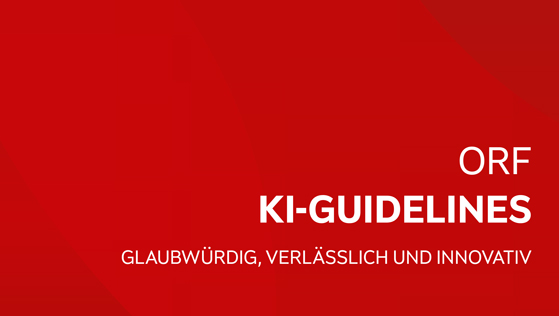 ORF-Generaldirektor Roland Weißmann hat das Thema künstliche Intelligenz (KI) frühzeitig als Unternehmensschwerpunkt verankert. Unter Federführung der ORF-Direktion für Technik und Digitalisierung von Harald Kräuter setzt sich der ORF daher bereits seit Jahren intensiv damit auseinander und nutzt die Chancen neuer Technologien für Effizienzsteigerungen und weitere Optimierungen des Programmangebots: Im vergangenen Jahr hat der ORF mit seiner selbstentwickelten KI-Software "AiDitor" den europäischen Technologie - und Innovations-Award der European Broadcast Union (EBU) gewonnen, mit dem herausragende technische Lösungen von Medienunternehmen ausgezeichnet werden, und damit seine Vorreiterrolle in Europa im Bereich Innovation unterstrichen. Mit den nun vorgelegten KI-Guidelines folgt der nächste Schritt in der ambitionierten KI-Strategie des ORF: Damit sollen der verstärkte Einsatz von KI im Unternehmen ermöglicht, effiziente neue Arbeitsweisen gefördert und die Belegschaft weiter für das Thema sensibilisiert werden. Die KI-Richtlinien des ORF stehen unter dem Motto "Chancen nutzen, Verantwortung übernehmen" und unterstreichen dessen Rolle als innovatives Technologieunternehmen und als glaubwürdige Informationsquelle.
ORF-Generaldirektor Roland Weißmann hat das Thema künstliche Intelligenz (KI) frühzeitig als Unternehmensschwerpunkt verankert. Unter Federführung der ORF-Direktion für Technik und Digitalisierung von Harald Kräuter setzt sich der ORF daher bereits seit Jahren intensiv damit auseinander und nutzt die Chancen neuer Technologien für Effizienzsteigerungen und weitere Optimierungen des Programmangebots: Im vergangenen Jahr hat der ORF mit seiner selbstentwickelten KI-Software "AiDitor" den europäischen Technologie - und Innovations-Award der European Broadcast Union (EBU) gewonnen, mit dem herausragende technische Lösungen von Medienunternehmen ausgezeichnet werden, und damit seine Vorreiterrolle in Europa im Bereich Innovation unterstrichen. Mit den nun vorgelegten KI-Guidelines folgt der nächste Schritt in der ambitionierten KI-Strategie des ORF: Damit sollen der verstärkte Einsatz von KI im Unternehmen ermöglicht, effiziente neue Arbeitsweisen gefördert und die Belegschaft weiter für das Thema sensibilisiert werden. Die KI-Richtlinien des ORF stehen unter dem Motto "Chancen nutzen, Verantwortung übernehmen" und unterstreichen dessen Rolle als innovatives Technologieunternehmen und als glaubwürdige Informationsquelle.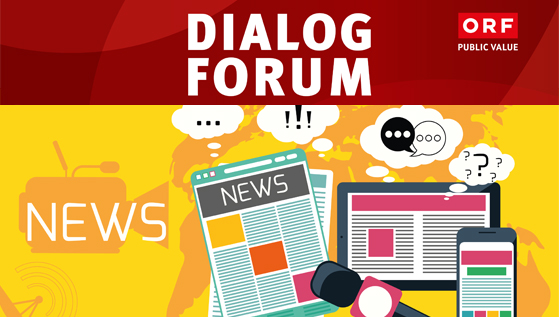 Sind Radio, Fernsehen und Internet für alle da?
Sind Radio, Fernsehen und Internet für alle da? Wie steht es um die öffentlich-rechtlichen Medienhäuser in Europa? Zum halbjährlichen Public Value DACH-Treffen, trafen sich am 14.-15. Oktober 2024 die Public Value-Beauftragten der öffentlich-rechtlichen Medienhäuser aus Deutschland, Schweiz und Österreich in Wien, um sich genau dieser Frage zu widmen.
Wie steht es um die öffentlich-rechtlichen Medienhäuser in Europa? Zum halbjährlichen Public Value DACH-Treffen, trafen sich am 14.-15. Oktober 2024 die Public Value-Beauftragten der öffentlich-rechtlichen Medienhäuser aus Deutschland, Schweiz und Österreich in Wien, um sich genau dieser Frage zu widmen.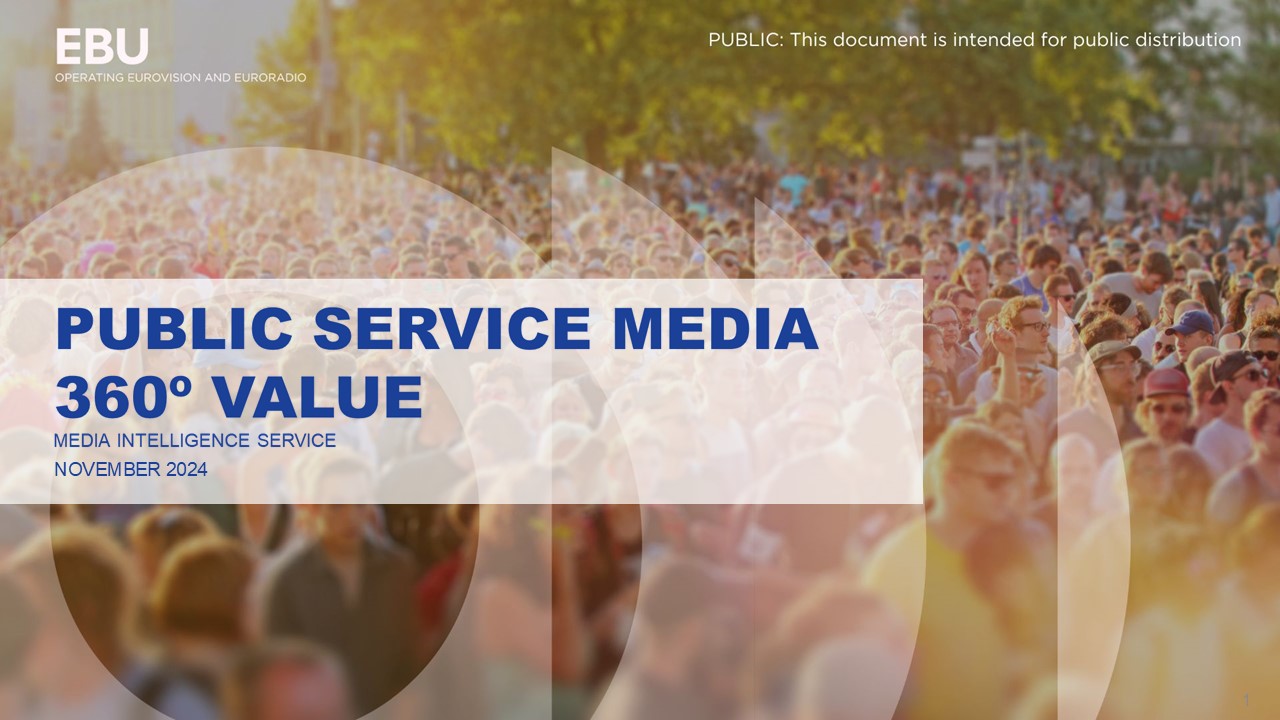
In einem neuen Bericht dokumentiert die Europäische Rundfunk Union (EBU) die Leistungen von öffentlich-rechtlichen Medien in mehreren Lebensbereichen. So generiert etwa jeder Euro, der in öffentlich-rechtliche Medien investiert wird, schlussendlich fast das Dreifache in der Wirtschaft. Das sichert über 60.000 Arbeitsplätze in Europa.
Nachrichten, Vertrauen und Demokratie
Mit ganzen sechs Milliarden Euro jährlich wird die Nachrichtenberichterstattung finanziert. Gemeinsam bilden die öffentlich-rechtlichen-Medien Europas größte Nachrichtenredaktion mit über 43.000 Journalist:innen. In 91% der Staaten sind sie die Nachrichtenmarke mit dem größten Vertrauen.
Mit insgesamt 535 linearen regionalen Medien- und zusätzlich 116 linearen regionalen Nachrichtendiensten sind öffentlich-rechtliche Medien auch in jenen Regionen Europas aktiv, in denen es sonst keine regionalen Nachrichten gibt.
In Staaten mit gut finanzieren öffentlich-rechtlichen Medien ist die Polarisierung der Gesellschaft geringer. Bürger:innen fühlen sich eher gehört und das Vertrauen zueinander ist größer.
Kultur und Unterhaltung
Zwei Drittel des Kunst- und Kulturvideocontents in Europa werden vom öffentlich-rechtlichen Rundfunk in Auftrag gegeben. Gleichzeitig sind sie auch größten Inhaltszentren für europäische Inhalte. 92 Prozent der TV-Produktionen und 94 Prozent der Video-on-Demand-Inhalte sind europäischen Ursprungs. Netflix hat im Vergleich nur 36 Prozent europäische Inhalte.
Zusammen senden europäische öffentlich-rechtliche Medien in TV und Radio über 1,5 Millionen Stunden kulturellen Inhalts pro Jahr. Sie unterhalten 161 Musikensembles und sind auch die größten Auftraggeber für europäische Dokumentarfilme: Mehr als die Hälfte Jahresgesamtförderung stammt aus öffentlich-rechtlicher Hand.
Gesellschaft & Vielfalt
Die öffentlich-rechtlichen Medien decken alle Zielgruppen in Europa ab. Sie erreichen wöchentlich 81 Prozent der Bürger:innen, darunter 68% der Jugendlichen. Über die Hälfte der Haupt-Radiosender sind die Nummer eins in ihrem Markt und in 91 Prozent der Märkte belegen die Öffentlich-Rechtlichen einen Platz in den Top 5. Rund die Hälfte der Haupt-TV-Kanäle sind Spitzenreiter und 84 Prozent von ihnen mindestens Top 5.
Online nutzen 91 Millionen Bürger:innen Europas monatlich öffentlich-rechtliche Video on Demand-Angebote. Hinzu kommen 51 Millionen Nutzer:innen öffentlich-rechtlicher Apps.
248 Radio-, TV- und Online-Dienste der öffentlich-rechtlichen Medien richten sich dabei an Minderheiten. Insgesamt produziert die EBU Medien in 166 Sprachen. 80% aller öffentlich-rechtlichen Medien bieten Inhalte mit Untertitelung, Audiodeskription oder Gebärdensprache.
Öffentlich-rechtliche Medien bieten auch sichere Online-Räume für Kinder. Ganze 85 Prozent von Ihnen bieten ein Online-Angebot, das speziell für Kinder entwickelt wurde und mehr als die Hälfte von Ihnen arbeiten mit Akademikern und Universitäten zusammen, um Innovationen für die zukünftigen Generationen voranzutreiben.
Weiters sammelten europäische öffentlich-rechtliche Medien 2023 über 800 Millionen Euro im Rahmen von Spendenaktionen. Sie unterstützten damit eine Vielzahl von Anliegen, von bedürftigen Kindern über Katastrophenhilfe bis hin zur medizinischen Forschung.
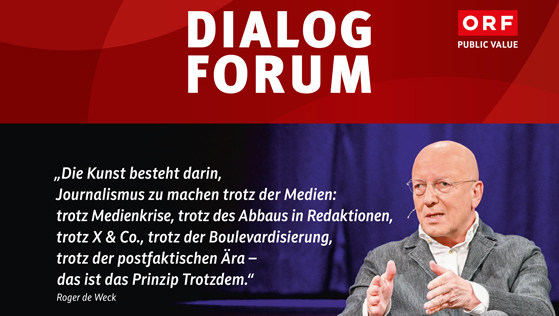 Schreitet die weltweite Expansion von Google & Co ungehindert voran oder findet die EU wirkungsvolle Maßnahmen der Regulierung? Kann sich Qualitätsjournalismus angesichts der global agierenden Konzerne und der radikal veränderten Mediennutzung behaupten? Kommt es 2025 zu einem neuen ORF-Gesetz, um die Unabhängigkeit seiner Gremien zu garantieren? Was meint Roger de Weck mit dem Titel seines Buchs "Prinzip Trotzdem. Warum wir den Journalismus vor den Medien retten müssen"?
Schreitet die weltweite Expansion von Google & Co ungehindert voran oder findet die EU wirkungsvolle Maßnahmen der Regulierung? Kann sich Qualitätsjournalismus angesichts der global agierenden Konzerne und der radikal veränderten Mediennutzung behaupten? Kommt es 2025 zu einem neuen ORF-Gesetz, um die Unabhängigkeit seiner Gremien zu garantieren? Was meint Roger de Weck mit dem Titel seines Buchs "Prinzip Trotzdem. Warum wir den Journalismus vor den Medien retten müssen"?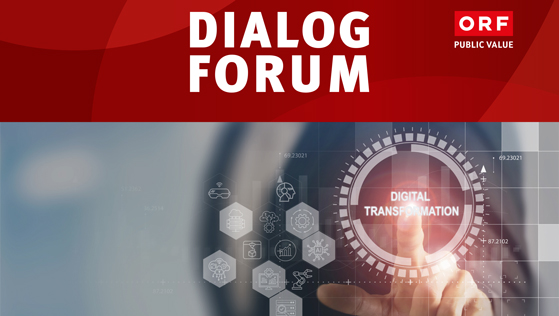 Wir alle sind online und nutzen die Angebote der digitalen Giganten: Facebook, TikTok, WhatsApp, Instagram, Signal, X oder YouTube. Aber was bieten öffentlich-rechtliche Medien? Wie halten sie Schritt mit der enormen Technolgieentwicklung? Stehen sie der globalen Social-Media-Welt ohnmächtig gegenüber und können sie den Digital Giants nur mehr zuliefern? Wie erhalten sie ihre Relevanz und Bedeutung in der Gesellschaft?
Wir alle sind online und nutzen die Angebote der digitalen Giganten: Facebook, TikTok, WhatsApp, Instagram, Signal, X oder YouTube. Aber was bieten öffentlich-rechtliche Medien? Wie halten sie Schritt mit der enormen Technolgieentwicklung? Stehen sie der globalen Social-Media-Welt ohnmächtig gegenüber und können sie den Digital Giants nur mehr zuliefern? Wie erhalten sie ihre Relevanz und Bedeutung in der Gesellschaft? Seit 100 Jahre ist Radio ein täglicher Begleiter für die Menschen in Österreich. Darauf deuten nun auch Untersuchungen der Europäischen Rundfunk Union (EBU) hin. In Österreich wird mehr Radio gehört als in den meisten europäischen Ländern. Es wird sichtbar, dass das Radio immer noch einen hohen Stellenwert in der Gesellschaft hat, der auch nicht so schnell verschwinden wird, so die EBU-Trendprognose. Gleichzeitig wird das Radio mobiler, vielfältiger und vor allem zukunftstauglicher.
Seit 100 Jahre ist Radio ein täglicher Begleiter für die Menschen in Österreich. Darauf deuten nun auch Untersuchungen der Europäischen Rundfunk Union (EBU) hin. In Österreich wird mehr Radio gehört als in den meisten europäischen Ländern. Es wird sichtbar, dass das Radio immer noch einen hohen Stellenwert in der Gesellschaft hat, der auch nicht so schnell verschwinden wird, so die EBU-Trendprognose. Gleichzeitig wird das Radio mobiler, vielfältiger und vor allem zukunftstauglicher.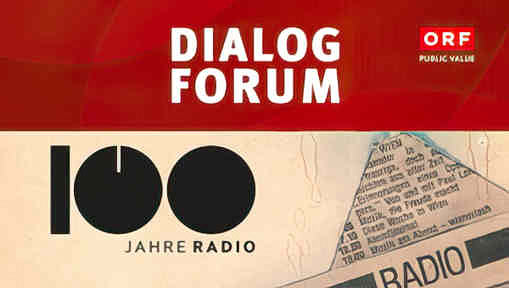 Ausbreitung von Falschnachrichten vor allem in sozialen Medien, Dominanz weniger kommerzieller Konzerne über die Geräte vieler, Zunahme der Informationsflut im Digitalen, während Zeitungen sterben, persönliche Daten kapitalisiert und öffentlich-rechtliche Medien politisch bedroht werden. Wer Medien über Medien nutzt, bekommt besorgniserregende Informationen. Wie kann, wie soll in diesem Umfeld die Radiostory weitergehen? 100 Jahre Erfolg sind ein Auftrag für die Zukunft. Welcher?
Ausbreitung von Falschnachrichten vor allem in sozialen Medien, Dominanz weniger kommerzieller Konzerne über die Geräte vieler, Zunahme der Informationsflut im Digitalen, während Zeitungen sterben, persönliche Daten kapitalisiert und öffentlich-rechtliche Medien politisch bedroht werden. Wer Medien über Medien nutzt, bekommt besorgniserregende Informationen. Wie kann, wie soll in diesem Umfeld die Radiostory weitergehen? 100 Jahre Erfolg sind ein Auftrag für die Zukunft. Welcher?
Die Forschung scheint darauf hinzudeuten, dass der Erfolg bei der Abwehr der Auswirkungen von Desinformation in hohem Maße von der Fähigkeit einer Gesellschaft abhängt, vertrauenswürdige gesellschaftliche Systeme und Strukturen zu schaffen, von der Unterstützung vertrauenserweckender Wissenseinrichtungen durch eine Gesellschaft und von den Bemühungen einer Gesellschaft, die Kompetenz der Bevölkerung zu stärken, damit diese in der Lage ist, vertrauenswürdige Quellen zu erkennen. Zusammenfassend lässt sich sagen, dass ein gesundes Maß an Vertrauen im Mittelpunkt steht. Vertrauen ist besonders wichtig bei Wahlen, die eine der einflussreichsten demokratischen Aktionen sind, die den Bürgerinnen und Bürgern zur Verfügung stehen.
Um der Verbreitung von Falschinformationen durch Social-Media-Plattformen entgegenzuwirken, hat die EU durch den Europäischen Rechtsakt über die Medienfreiheit entscheidende Weichen gestellt.
Hinderlich erscheint indes, dass das geografische Gebiet, das die EU reguliert, sehr vielfältig ist, und folglich über unterschiedliche Fähigkeiten und Ressourcen verfügt, diese Richtlinien umzusetzen.
Darüber hinaus, so die Autor:innen, seien Politiker:innen und Regierungsbedienstete nach wie vor eine wesentliche Ursache für Desinformation in ganz Europa, was erhebliche Probleme aufwerfe, da diese Personen für die Ausarbeitung von Anti-Desinformationsmaßnahmen und -vorschriften zuständig seien.
Öffentlich-rechtliche Medien können ein wichtiger nationaler Akteur bei der Stärkung des institutionellen und zwischenmenschlichen Vertrauens - und damit der Widerstandsfähigkeit gegen Desinformation - sein, wenn man ihnen dies erlaubt und sie angemessen unterstützt.
Anmerkung: Den ganzen Artikel auf Englisch finden Sie auf der Website der Public Media Alliance.



